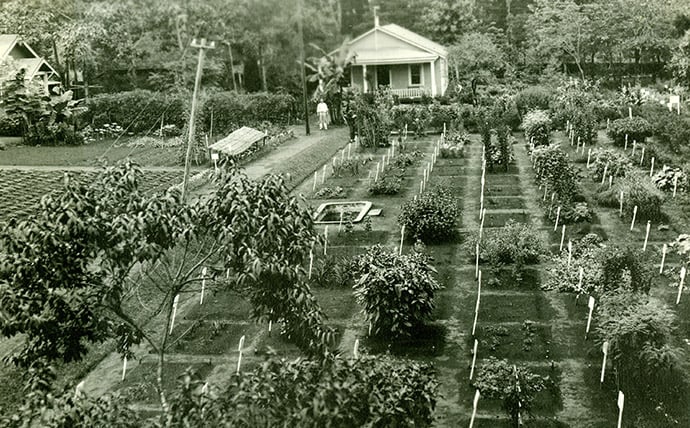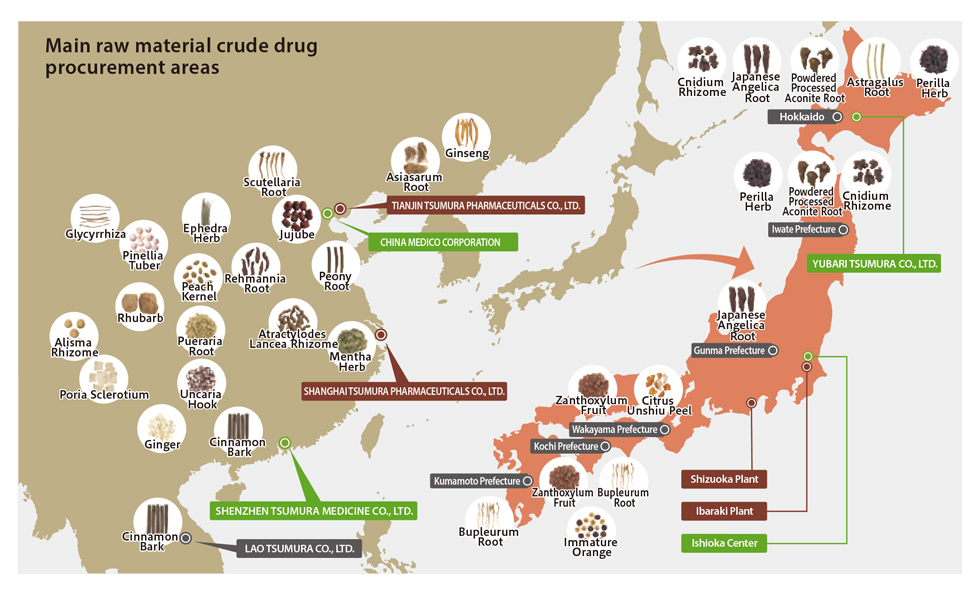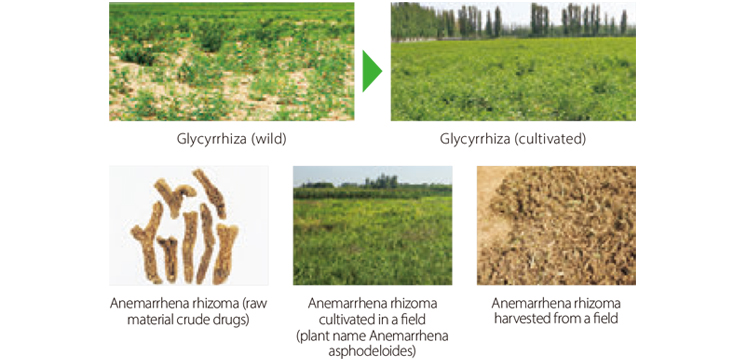Biodiversity and Sustainable Procurement of Raw Materials
Approach Since our Foundation
Depletion of natural resources, such as wild plants, poses a direct management risk to the Tsumura Group, since its business uses crude drugs as raw materials. Given this background, we have a long history of working to preserve biodiversity, from our earliest days. The first president, Jusha Tsumura, considered the identification of varieties that can be used as raw material crude drugs, their cultivation backed by science, and the preservation of varieties as important priorities from the time of the Company’s foundation, and made a tremendous effort in this area. In 1924, we founded Tsumura Research Institute for Pharmaceutical Science for the purpose of conducting scientific research and analysis of botanical compounds and Kampo medicines. In subsequent years, the results from the institute have contributed significantly to the rise of Kampo medicines. Furthermore, at the same time as the foundation of the institute, Jusha also started work on establishing the Tsumura Medicinal Plant Garden.

Around the time, Dr. Tomitaro Makino, Japan’s leading authority on plant taxonomy, was in charge of the Journal of Japanese Botany, an international academic journal that was concerned with the survey and study of wild plants. In 1926, Jusha approved of Dr. Makino’s activities and decided to support him, and so Tsumura Research Institute for Pharmaceutical Science took over publication of the journal. The two men collaborated through the creation of the journal, working for many years to bring to light the diversity of Asian plants and promote the taxonomic and pharmacognostical evaluation of medicinal plants, which are the foundation of Kampo medicines, as well education.
Over the past few years, the Group has been focusing on the development of advanced appraisal technology for plant varieties, building a plant variety library, and developing expert human resources in order to pass on bountiful ecosystems to the next generation. In addition, the Group has analyzed and evaluated variations in quality caused by differences in the production environment and harvest timings of raw material crude drugs (medicinal crops), accumulating production expertise for ensuring consistency. Currently, Tsumura has indicated consideration for biodiversity in the Sustainability Charter formulated in 2022, and is actively implementing a range of measures, such as appropriate harvesting of wild crude drugs, careful management of crude drug production based on the Tsumura GACP, and appropriate use and testing of agrochemicals

Goals and Progress
| Item | Progress (FY2022 Results) |
Target | FY2031 targets (reference year: FY2020, 34 items) |
|---|---|---|---|
| Number of wild crude drugs used to manufacture Kampo and crude drug products | Countermeasures for wild crude drugs (23 items) were planned and are being implemented. | ◎ | 11 items |
◎・・・Entire Tsumura Group
Key initiative
Cultivation of Wild Crude Drugs
With a view to preserving biodiversity, the Group has included a target of reducing the number of wild crude drugs it uses within its medium- to long-term environmental targets for fiscal 2031. Among the raw material crude drugs that we use, 110 are derived from plants, and 34 of these are wild plants. By introducing cultivation of these going forward, we aim to reduce the number of wild products used to 11 by fiscal 2031.
In fiscal 2022, we switched completely to cultivated products for a crude drug known as Anemarrhena rhizoma. Until now, we have needed a certain quantity of wild Anemarrhena rhizoma with a high level of standard ingredients, but improvement of the production method of the cultivated product has proved successful in increasing the level of standard ingredients, and through practical production testing, we are on course to be able to build a production system that does not depend on wild products.

Cooperation with Local Community though Crude Drug Cultivation
The Tsumura Group considers diversification of cultivation areas an important strategy for sustainable crude drug procurement. Among other advantages, this strategy helps to preserve the natural environment in cultivation areas, contributes to regional revitalization, and increases the productivity of farmers by transferring technologies to them.
Tosa Tsumura Forest
One of our main cultivation areas in Japan is the town of Ochi in Kochi Prefecture. Here, we are engaged in a joint forest project called the Tosa Tsumura Forest. The project is operated by four partners: Kochi Prefecture, Ochi Town, Human Life Tosa, and the Tsumura Group. 2023 marked the 16th year of the project, which was initiated in 2008 for the purpose of protecting the natural environment and revitalizing the region of the cultivation area. Tosa Tsumura Forest covers an area of approximately 77 ha., or around 16 times the area of the Tokyo Dome. In addition to preserving the water source for the Niyodogawa river system, Human Life Tosa members conduct medicinal plant harvesting and processing experience lessons for local junior high school students, while the Company’s employees contribute to systematic learning by providing visiting lessons and so forth.
Initiatives in Laos
In Laos, we cultivate raw material crude drugs in our own managed gardens. In 2011, we proposed a survey and removal of unexploded ordnance to ensure the safety of the land for the cultivation of crude drugs as a public-private partnership project.※ The proposal was accepted under the “Public-Private Partnership for Accelerating Growth” promoted by the Japanese government. Through this project, we are promoting expansion of local employment along with the transfer and diffusion of agricultural technologies.
- A governmental program begun in April 2008 to accept proposals from private companies for the purpose of contributing to the expansion of job opportunities, technology transfer, and trade and investment promotion, which ODA (Official Development Assistance) cannot pursue alone, through the cooperation between private companies' activities and the ODA in developing countries.
Other activities
In cultivation areas in China, we are contributing to increased standards of living through the cultivation of crude drugs. In Sichuan Province, we are implementing a project with a local company to cultivate wild rhubarb. We have built an industrial chain of cultivation, harvesting, and processing, contributing to increased income for farmers and reducing uncontrolled harvesting of wild rhubarb. In Jilin Province, a large-scale ginseng processing plant is run by a local company. Strict quality management and inspection for agrochemicals residue and so forth have increased the brand reputation of the products, creating an exemplary model for sustainable local industry.
TNFD
In December 2023, Tsumura registered as a TNFD Adopter.
Based on this, in preparation for voluntary disclosure by the end of FY2024, we are examining methods to select locations for drug cultivation and production and evaluation methods in accordance with the LEAP approach. We conduct the examination mentioned above by inviting outside experts.
